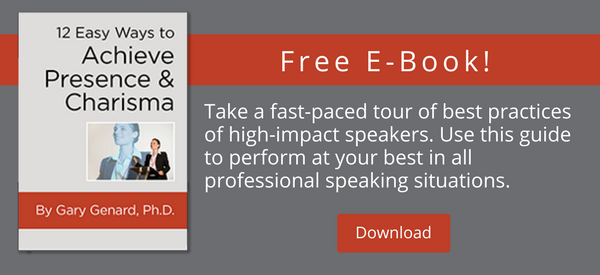
Wondering what to say in a job interview? Learn these 5 skills to stay relaxed, focused, poised, and to be at your best!
A few months ago, I appeared as the guest on Karen Kugel's "Living and Learning" cable show on a segment called "How to Give a Winning Job Interview." I'd like to share the contents of our talk, because it concerns an important part of my speech coaching practice: how to be at your best when you're auditioning for a job.
Gaining credibility and trust are vital in the time you have to prove yourself and win that position. Discover how to tap into your natural talents to connect with the people you need to convince. Get my free e-book, "12 Easy Ways to Achieve Presence and Charisma.
As always in my work, skills and approaches from the world of acting apply in this situation. Like actors who believe in performance that they are the character, for instance, you need to believe in yourself, with a focus on being rather than doing. And just as in the actor's paradox, at the same time you need to do some things to externalize what you think and feel. That's because the people doing the hiring, just like audience members, aren't mind-readers.
Here are five ways you can stay poised and focused to be confident, send the right signals, and present yourself at your best.
1. Improve Your Focus to Win Their Attention
Nervousness and fidgeting are natural expressions of the desire to do well in high-stakes situations, but you need to stay focused and still. If there's a lot going on, the person or group you're speaking to will pay attention to that, rather than what you're saying. So they may easily lose out on your important message or whatever you have to offer the company.
Settling in and knowing how to maintain focus allows the interviewer(s) to attend to who you are and what you're saying, rather than to everything else that's going on. In other words, this conversation needs to be a one-ring, not a three-ring event. Apart from watching the show, your listener(s) will also, of course, be wondering why you're so nervous.
2. Who You Are Matters More than Anything You Say
Coming across well requires being in the right place mentally. That is, understanding who you are is more important than anything you actually do in the interview.
The reason you're there is that presumably you have something that the company is looking for. They're interested in you, and the possibility of your becoming a part of that company or organization. And so they really want to find out who you are and how you think, and what it might be like to interact with you. They're looking to find out whether you can be part of a team and work together with the team that's already in place. So they're far more interested in those things than whether you answer any question correctly.
Sometimes interviewees make the mistake of trying to be clever rather than open and honest. In my coaching sessions on the job process, for instance, I always include inquiries that are not only difficult, but impossible to answer "correctly." What's really being asked is, "How do you think?" In the job itself, you'll be faced with situations that are unexpected and that test your creativity and resourcefulness. That's what's actually being tested now.

3. Do Your Homework on the Company and Industry
Demonstrate that you're genuinely interested in this sector. Have you had any experience in it? If not, don't let that undermine your confidence. Show that you know how to do quality research. A key element of quelling your nervousness is to be prepared, and to have some good answers. Equally important, when you're asked if you have any questions (as you will be), pose some that are relevant, and that you'd really like the answers to.
So be prepared, and again, be your honest self. You'll have both ends covered in terms of credibility and honesty. But you'll also show that you have taken the initiative to learn something about the organization. And remember this: the company is auditioning for you, just as you are for them. Keep that in mind as another boost to your confidence and sense of command.

4. Be Physically Expressive to Make a Connection
In a nod to Sheryl Sandberg, it isn't too much to say you need to "lean in," in this sense literally. That's because you need to get your entire persona across space to the people you're talking to. Here again, you need to ply the actor's trade in terms of reaching and connecting with those you're trying to convince.
Start thinking in terms of the physical expression of both you and what you're saying. After all, you're not a talking head! One of the best ways you can show people you're interested, for instance, is to lean slightly in, while nodding frequently. Relaxed and appropriate body language goes a long way toward allowing people to feel comfortable in your presence, making them feel you're paying close attention. They also need to feel that something is happening: that there's a connection going back and forth. If you noticed that I used "feel" three times just now rather than "think," it's because the physical expression of a thought—and the feelings evoked on both sides—are vital aspects of being an effective communicator.

5. Use Your Voice (and Work on Your Phone Skills)
In addition to the in-person appearance, the phone interview is another type of job "audition." You may initially be talking with an HR person over the phone, i.e., a recruiter. Have you thought about your phone skills and whether they're helping your influence? Your voice is the most subtle, flexible, and ultimately powerful tool of performance. Whatever your current level of skill, you should know how to use the 5 key tools of vocal dynamics.
And get comfortable with silence, particularly on the phone. You shouldn't babble without thought simply to fill up a pause. Yet you must vocalize enough to let the person know you're still there and interested: "Oh," "yes," "I see," "uh-huh."
The link between the body and the expressive voice is strong, which means you should use body language when you're on the phone. Speak with a headset-with-microphone, or a Bluetooth connection. Make sure you smile, since the other(s) will hear it in your voice. You should also dress as you would for an in-person appearance, so you're fully in the moment.
A Last Point: Be Inclusive of Everyone
In addition to these five ways to be at your best, keep a final point in mind when you're presenting yourself in front of a group. This concerns speaking to a panel or hiring committee, the third type of interview you may face.
First, get yourself in the right place mentally: don't tell yourself it's an intimidating situation, and you wish you were talking to one person. A group appearance has the advantage that the decision doesn't come down to a single individual.
And that brings up my final suggestion: be inclusive. That is, make sure you include everyone in your remarks in terms of eye contact and body language. It's easy to play to the people who are obviously paying attention, and ignore everyone else. But you're not a mind reader, and you really don't know what's going on in anybody's head and who may be on your side. Whatever you see in terms of body language and attentiveness, don't take it to heart—don't let it shake you. After all, if you play to everyone, you'll reliably be including the power player(s) in the room. As always, bring in your physical persona, to come through in the fullness of who you are.
You should follow me on Twitter here.



